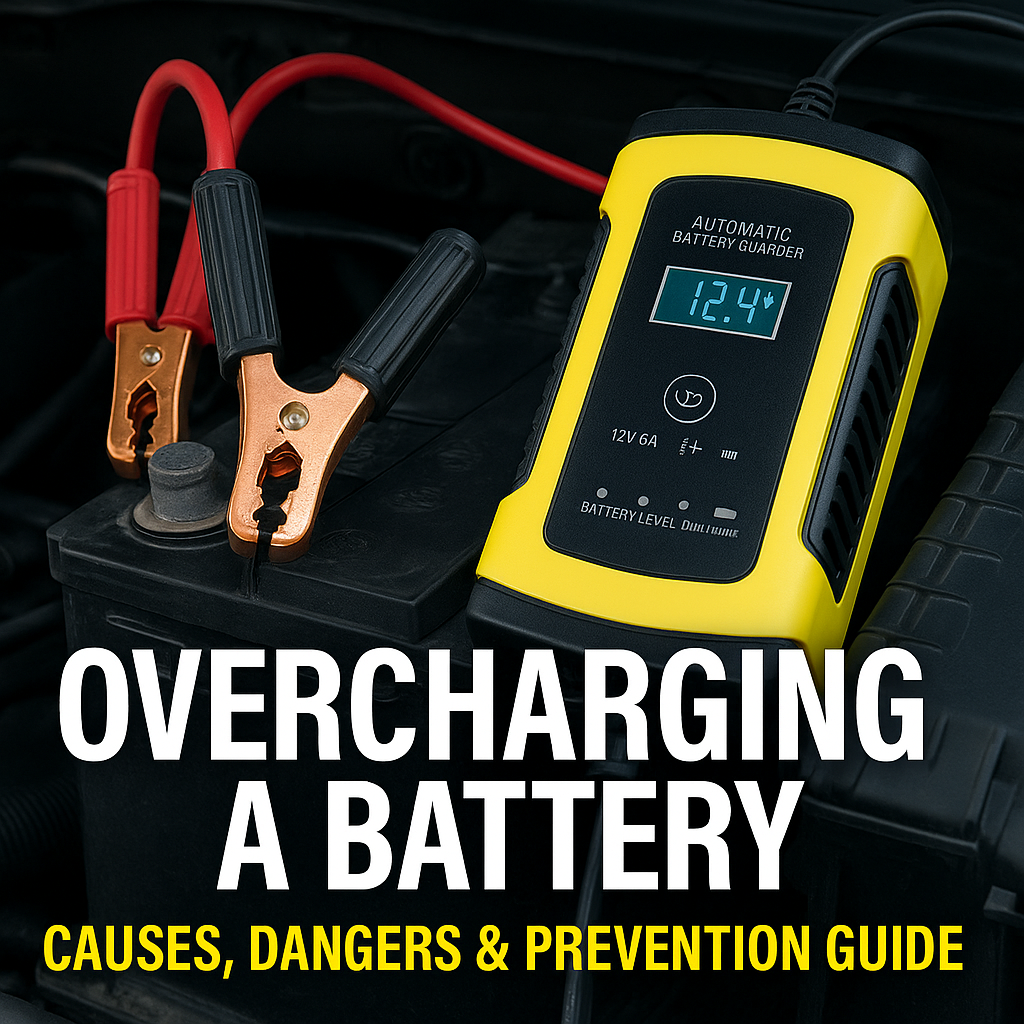Introduction
Batteries power much of our daily lives — from cars and motorcycles to golf carts, power banks, and household tools. While most people worry about a battery going dead, there’s another problem that is just as harmful: overcharging.
Overcharging a battery happens when it continues to receive more electrical energy than it can store. Instead of holding that extra charge, the battery converts it into excess heat, gas, or chemical breakdown, which can damage the cells, reduce performance, and even create safety risks like fire or explosion.
If you’ve ever wondered:
- What really happens when a battery is overcharged?
- How can I tell if my charger or alternator is causing it?
- What are the long-term effects?
- How can I safely prevent overcharging?
This article will cover everything in detail so you understand the science, practical signs, and solutions.
What Does Overcharging a Battery Mean?
A battery is designed to store a specific amount of energy. Once it reaches 100% capacity, any additional charging current becomes excess energy.
- Normal charging: Stops when the battery is full.
- Overcharging: Current keeps flowing into a full battery, causing overheating and chemical stress.
In a car battery (lead-acid), overcharging causes water inside the electrolyte to boil, leading to fluid loss and plate corrosion. In lithium-ion batteries, it increases pressure inside cells, which can swell, leak, or ignite.
Common Causes of Overcharging
Overcharging doesn’t just happen by accident — it’s usually the result of one of these issues:
1. Faulty Charger
- Old or cheap chargers without automatic shut-off continue sending current even after the battery is full.
- Using the wrong charger type for your battery (e.g., high-amp charger on a small battery).
2. Malfunctioning Alternator or Regulator
- In vehicles, the alternator recharges the battery while driving. If the voltage regulator fails, it may supply too much voltage (above 14.7V for a 12V battery).
3. User Error
- Leaving a charger connected for too long.
- Attempting to “top off” a battery unnecessarily.
- Using boost chargers too often.
4. Extreme Heat or Poor Ventilation
- Charging in hot environments accelerates overcharging damage.
Signs Your Battery Is Overcharging
- Excessive Heat – Battery feels hot to the touch during or after charging.
- Swelling or Bulging – Case expands due to gas buildup (especially in lithium-ion).
- Leaking Electrolyte – Corrosive fluid around terminals.
- Strong Rotten Egg Smell – Sulfur odor from boiling electrolyte in lead-acid batteries.
- Rapid Water Loss – Frequent refilling required in flooded lead-acid batteries.
- Shortened Battery Life – Replacing batteries more often than expected.
Effects of Overcharging a Battery
Overcharging isn’t just inconvenient — it can be dangerous. Here are the key consequences:
1. Reduced Battery Life
- Overcharging accelerates wear on internal plates and separators.
- A car battery that should last 4–5 years might fail in less than 2 if repeatedly overcharged.
2. Overheating
- Excess current becomes heat, which can melt internal components.
- In sealed batteries, heat increases internal pressure, leading to swelling.
3. Fluid Loss (Lead-Acid Batteries)
- Electrolyte water evaporates or boils off, leaving plates exposed.
- This leads to sulfation, corrosion, and permanent loss of capacity.
4. Safety Hazards
- Overcharged lithium-ion batteries risk thermal runaway (fire or explosion).
- Lead-acid batteries may vent hydrogen gas, which is flammable in enclosed spaces.
5. Damaged Electronics
- In vehicles, overcharging can spike system voltage.
- This can burn out headlights, onboard computers, and sensitive sensors.
How to Prevent Overcharging a Battery
Prevention is always easier (and cheaper) than replacing batteries early. Here’s how:
1. Use a Smart Charger
- Modern smart chargers monitor voltage and switch to “float mode” when the battery is full.
- They prevent both undercharging and overcharging.
2. Check Your Alternator and Regulator
- Have your vehicle’s charging system tested during regular service.
- A healthy alternator should keep voltage between 13.7–14.7V on a 12V battery.
3. Avoid Leaving Chargers Plugged in Indefinitely
- Even with trickle chargers, choose models with automatic shutoff.
- Set reminders to check batteries during long charging sessions.
4. Charge in a Cool, Ventilated Space
- Heat worsens overcharging effects.
- Always charge in a shaded garage, not direct sunlight.
5. Match the Charger to the Battery Type
- Lithium, AGM, and flooded batteries require different charge profiles.
- Using the wrong one risks overcharging or damaging the battery.
Step-by-Step: Safe Battery Charging at Home
- Check Your Battery Type – Lead-acid, AGM, or lithium.
- Use the Right Charger – Smart chargers with automatic shutoff are best.
- Prepare the Battery – Clean terminals, ensure good connections.
- Set Up Safely – Place the battery in a ventilated area.
- Connect Properly – Positive clamp first, then negative.
- Monitor Progress – Check for unusual heat, smells, or swelling.
- Unplug Promptly – Disconnect once fully charged.
Can an Overcharged Battery Be Fixed?
In some cases, yes — but it depends on the battery type and damage level:
- Lead-Acid Batteries:
- If only mildly overcharged, refill electrolyte (if serviceable) and recharge correctly.
- If plates are warped or electrolyte has boiled away, replacement is necessary.
- Lithium-Ion Batteries:
- Once swollen or overheated, they are unsafe to use. Replacement is the only safe option.
- AGM/Sealed Batteries:
- Cannot be refilled. If overcharged badly, they must be replaced.
FAQs About Overcharging a Battery
1. Can overcharging a car battery ruin it?
Yes. Continuous overcharging reduces the battery’s lifespan, causes overheating, and can permanently damage internal components.
2. How long does it take to overcharge a battery?
It depends on the charger. With older chargers, even a few extra hours past full charge can start damaging the battery.
3. What voltage is too high for a 12V car battery?
Anything consistently above 14.7V indicates overcharging and could damage the battery.
4. Can a trickle charger overcharge a battery?
If it lacks automatic shut-off or float mode, yes. Modern trickle chargers with safety features won’t overcharge.
5. Is it safe to leave a car battery charging overnight?
With a smart charger, yes. With a manual charger, no — it risks overcharging.
Conclusion
Overcharging a battery is one of the fastest ways to shorten its life and risk safety hazards. Whether you’re dealing with a car battery, golf cart battery, or lithium-ion tool battery, the principle is the same: once it’s full, stop charging.
To protect your batteries:
- Use smart chargers with auto shut-off.
- Test your alternator regularly.
- Avoid leaving chargers connected indefinitely.
- Charge in a cool, ventilated environment.
Taking these precautions not only extends the life of your battery but also keeps your vehicle and electronics safe.

